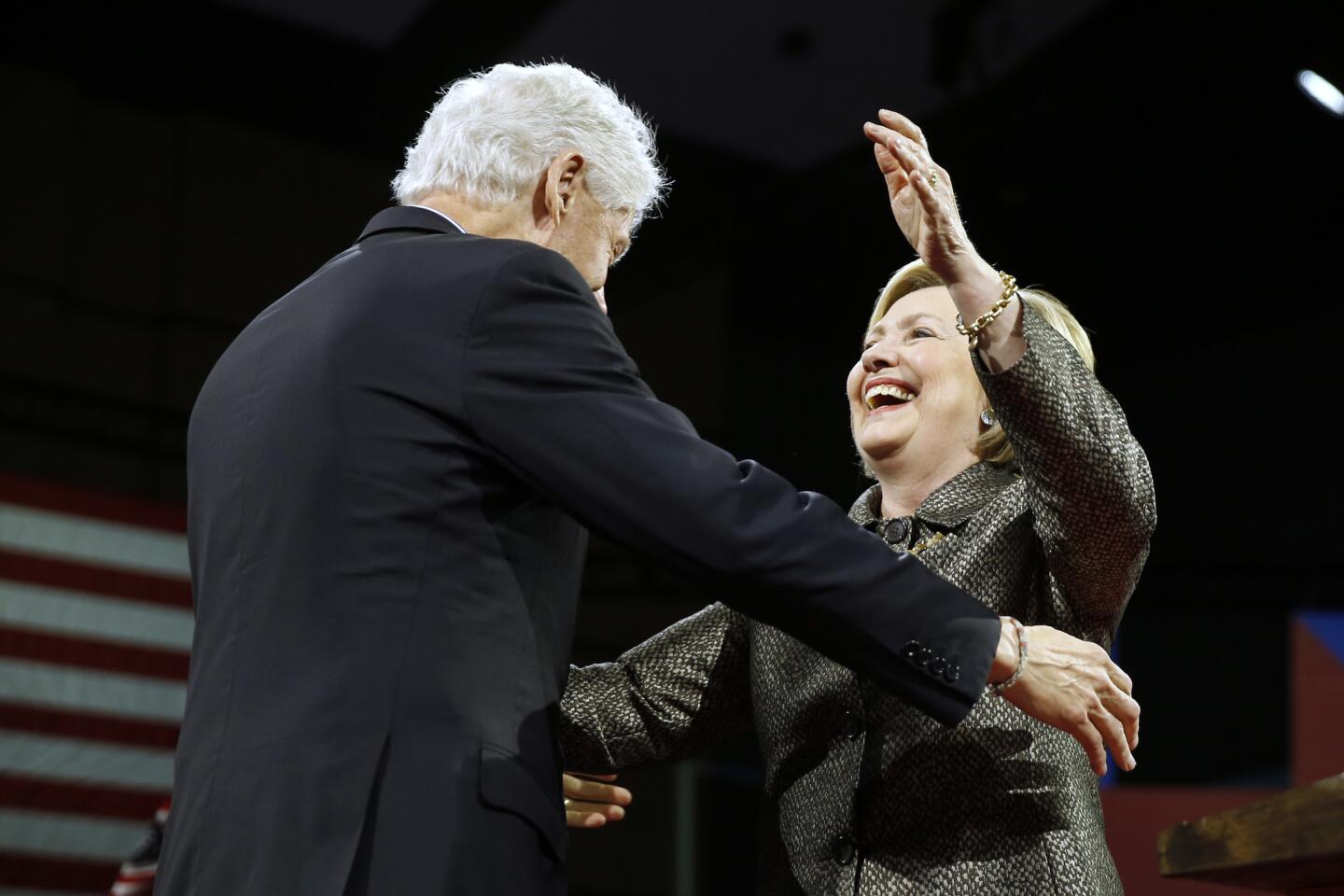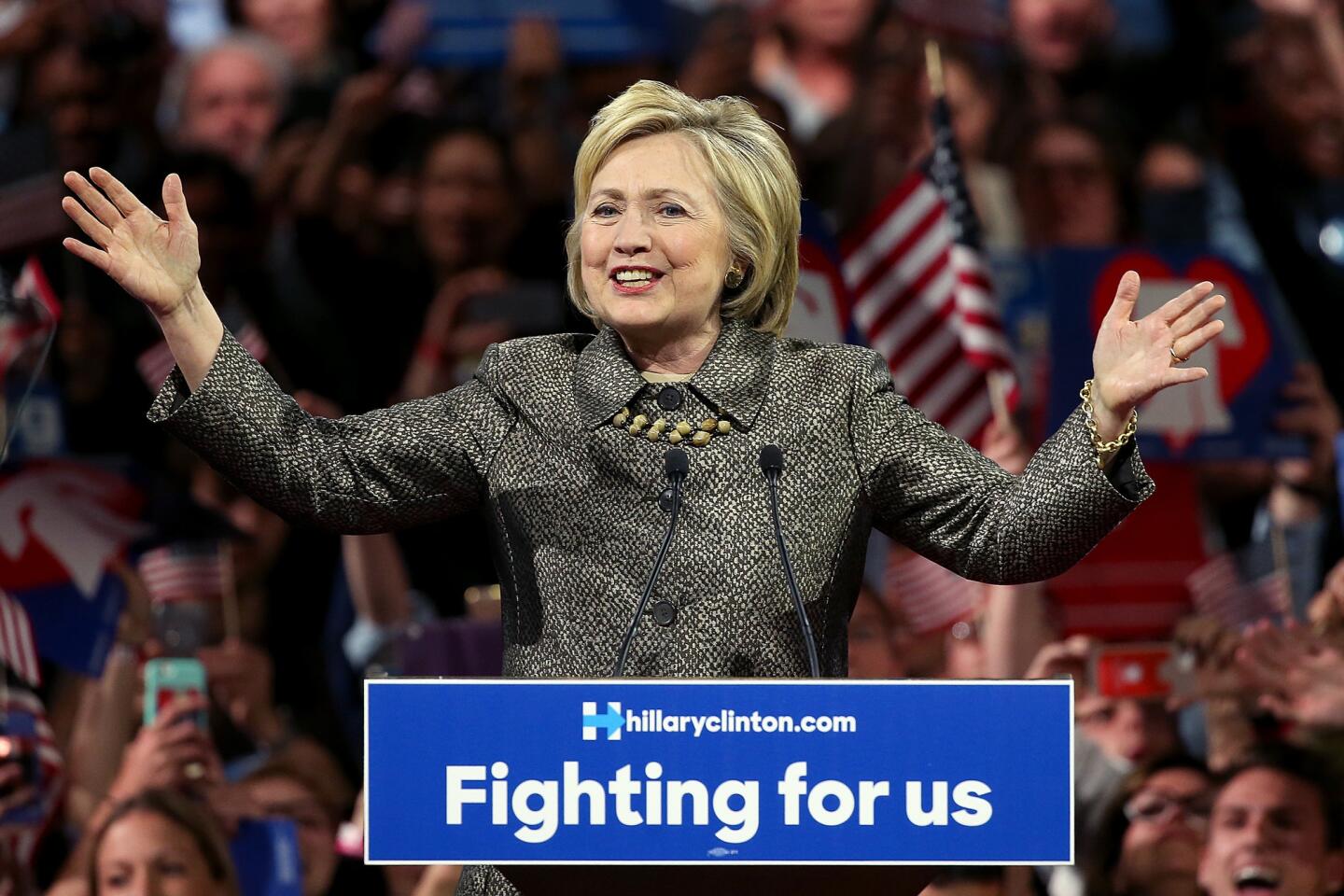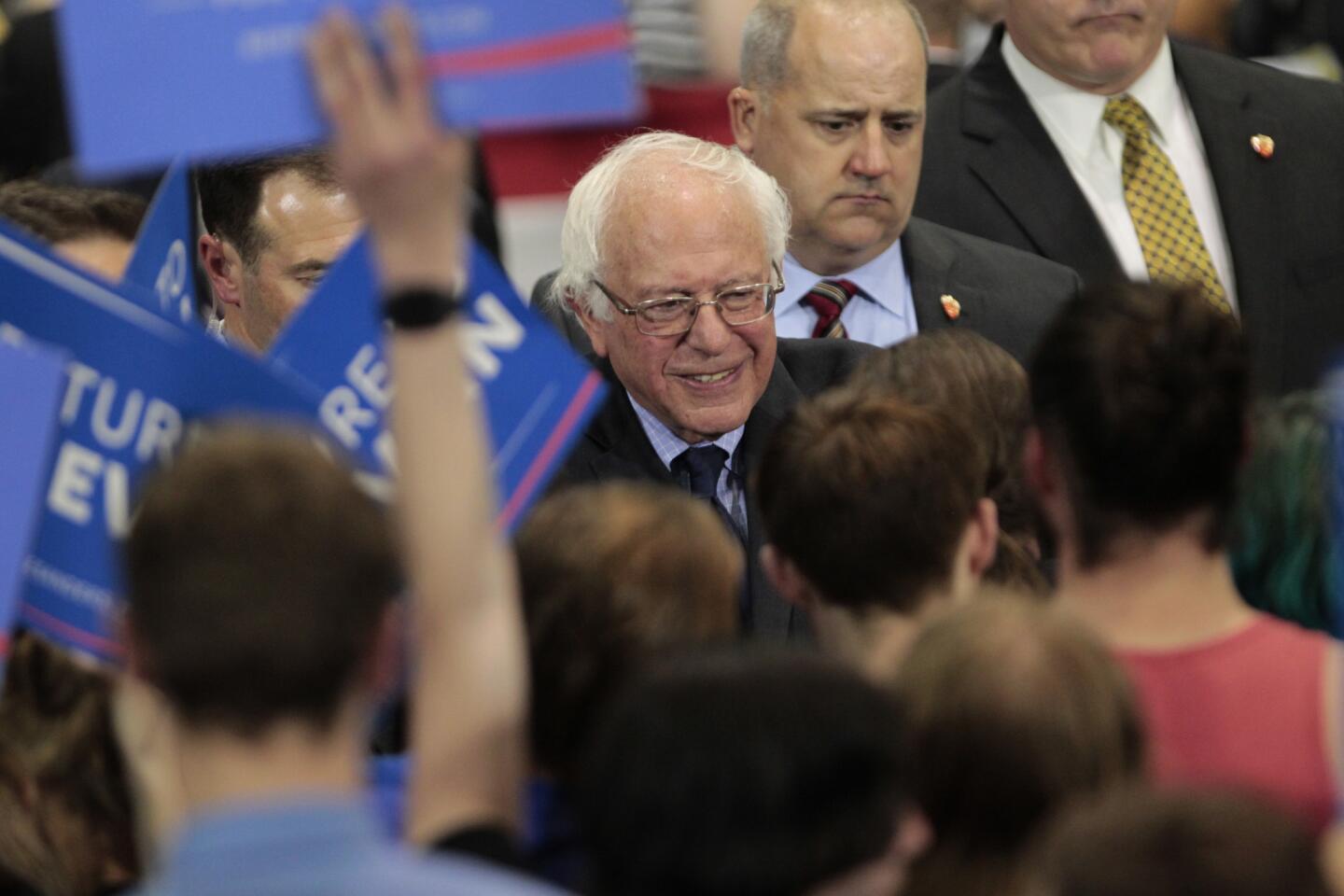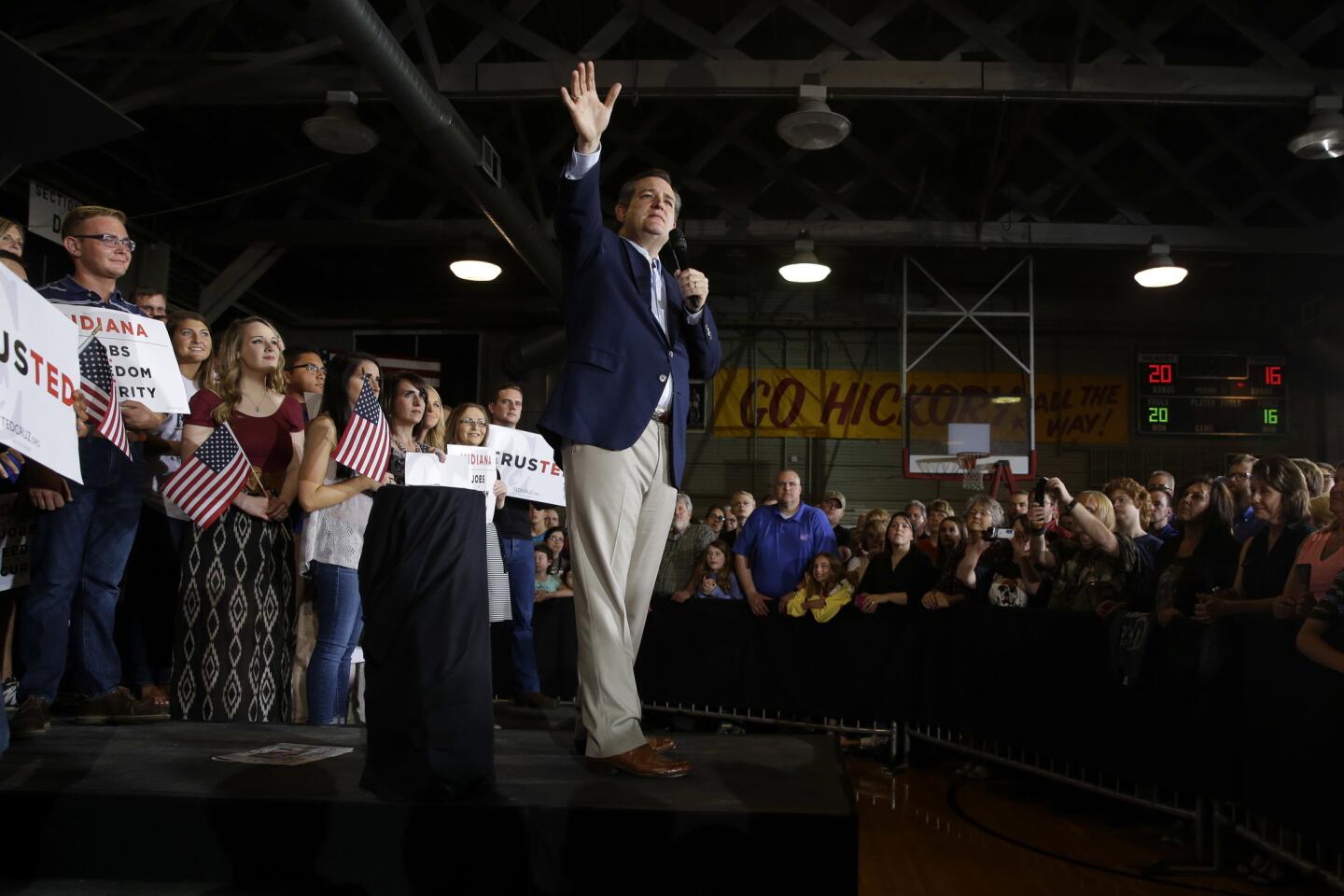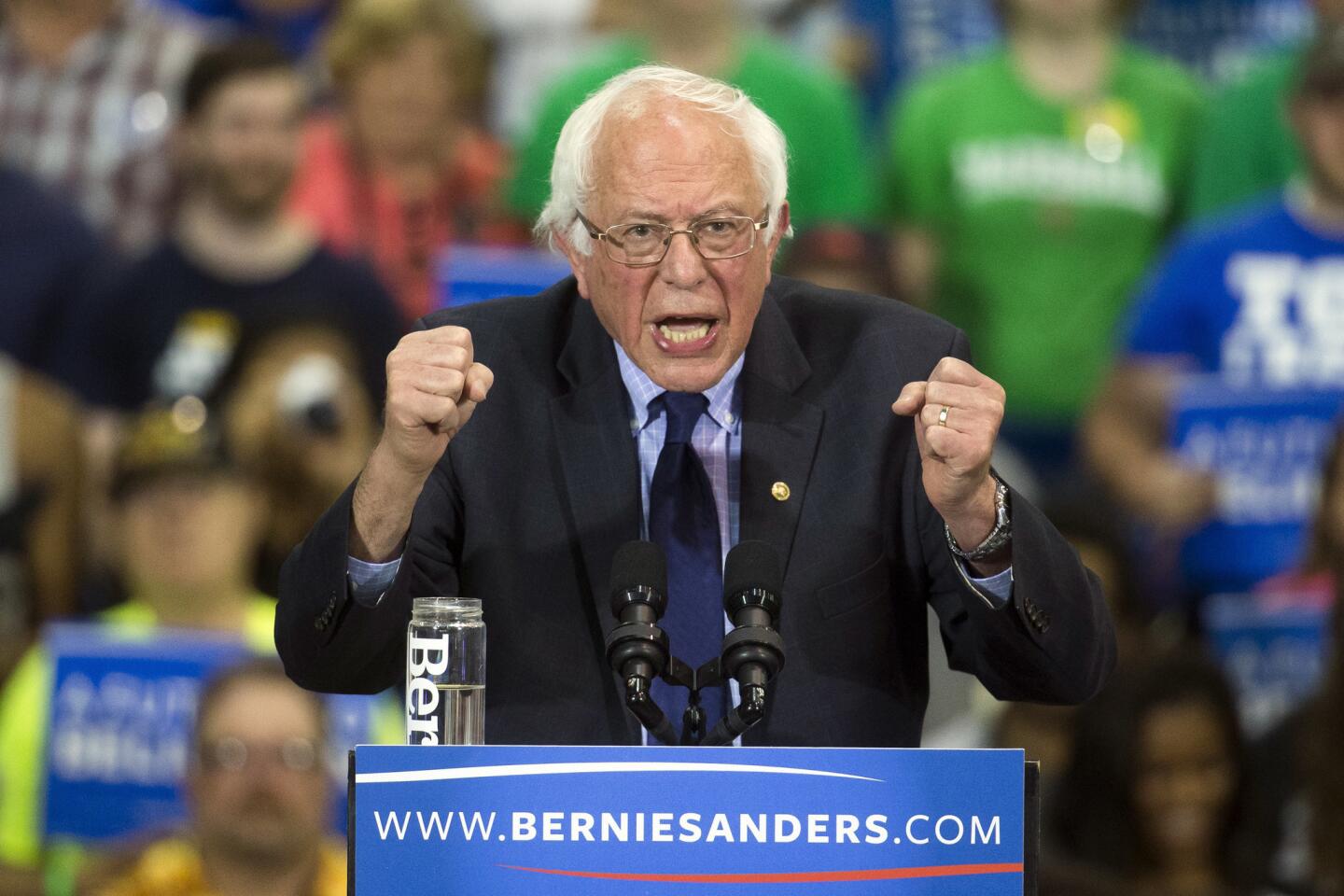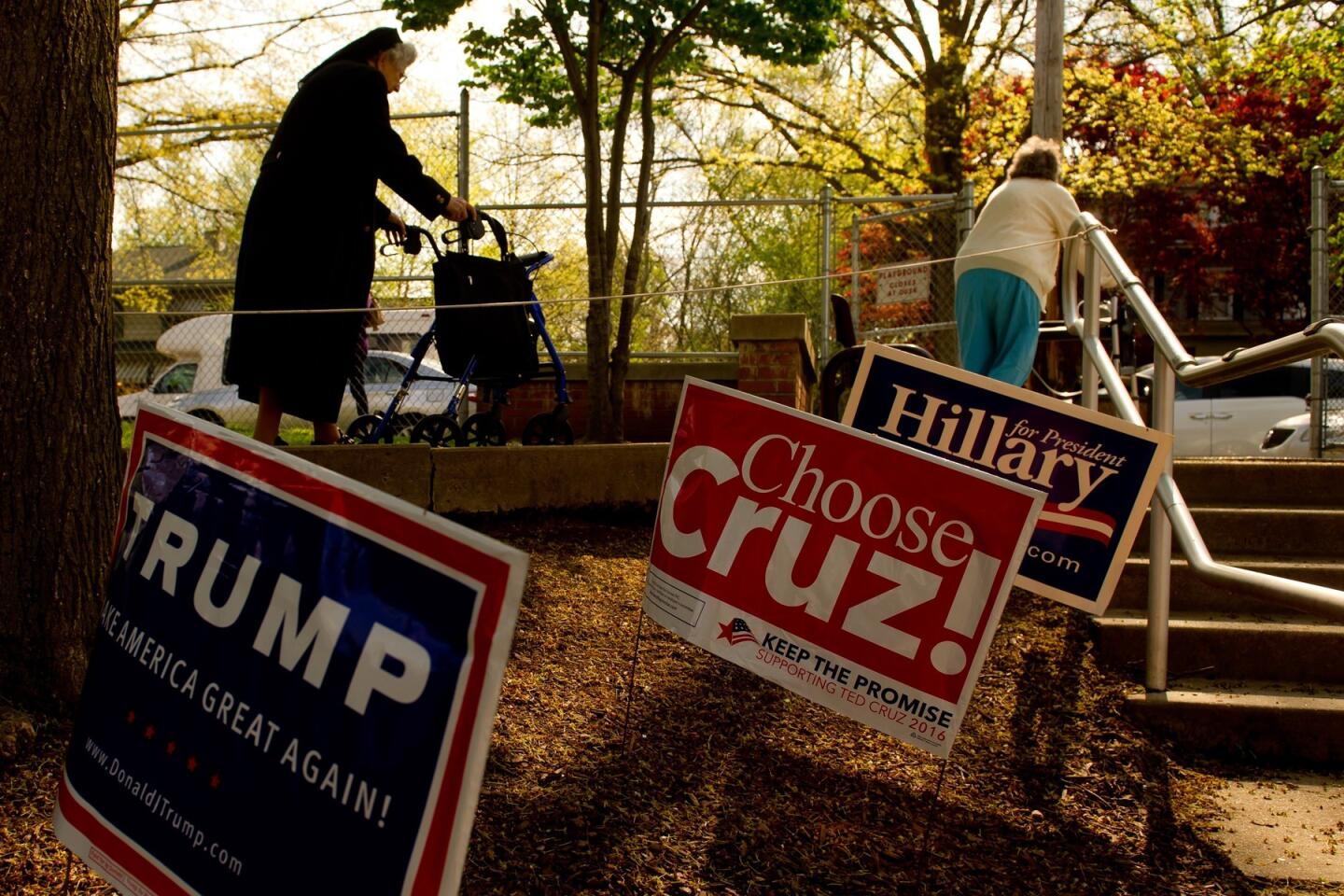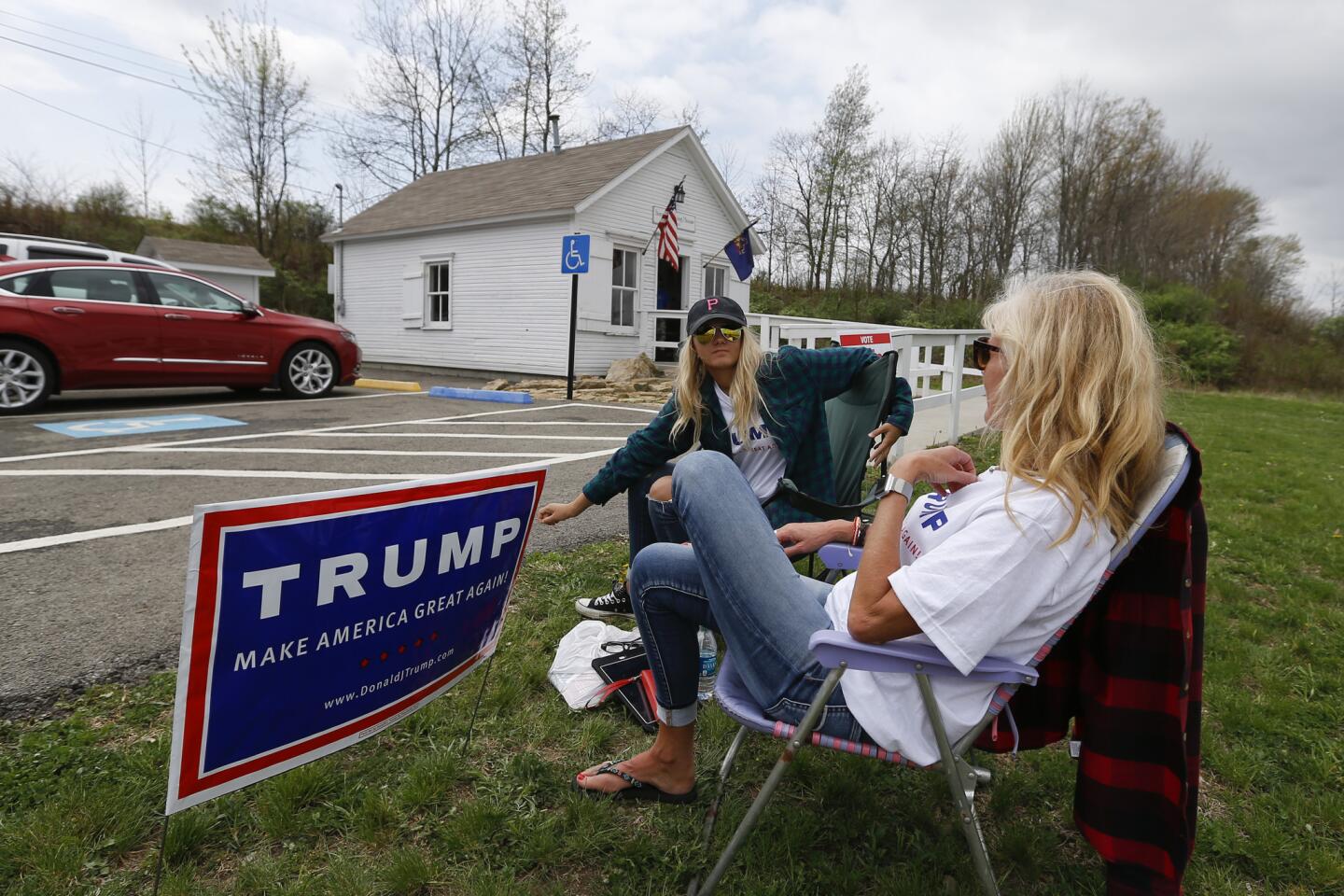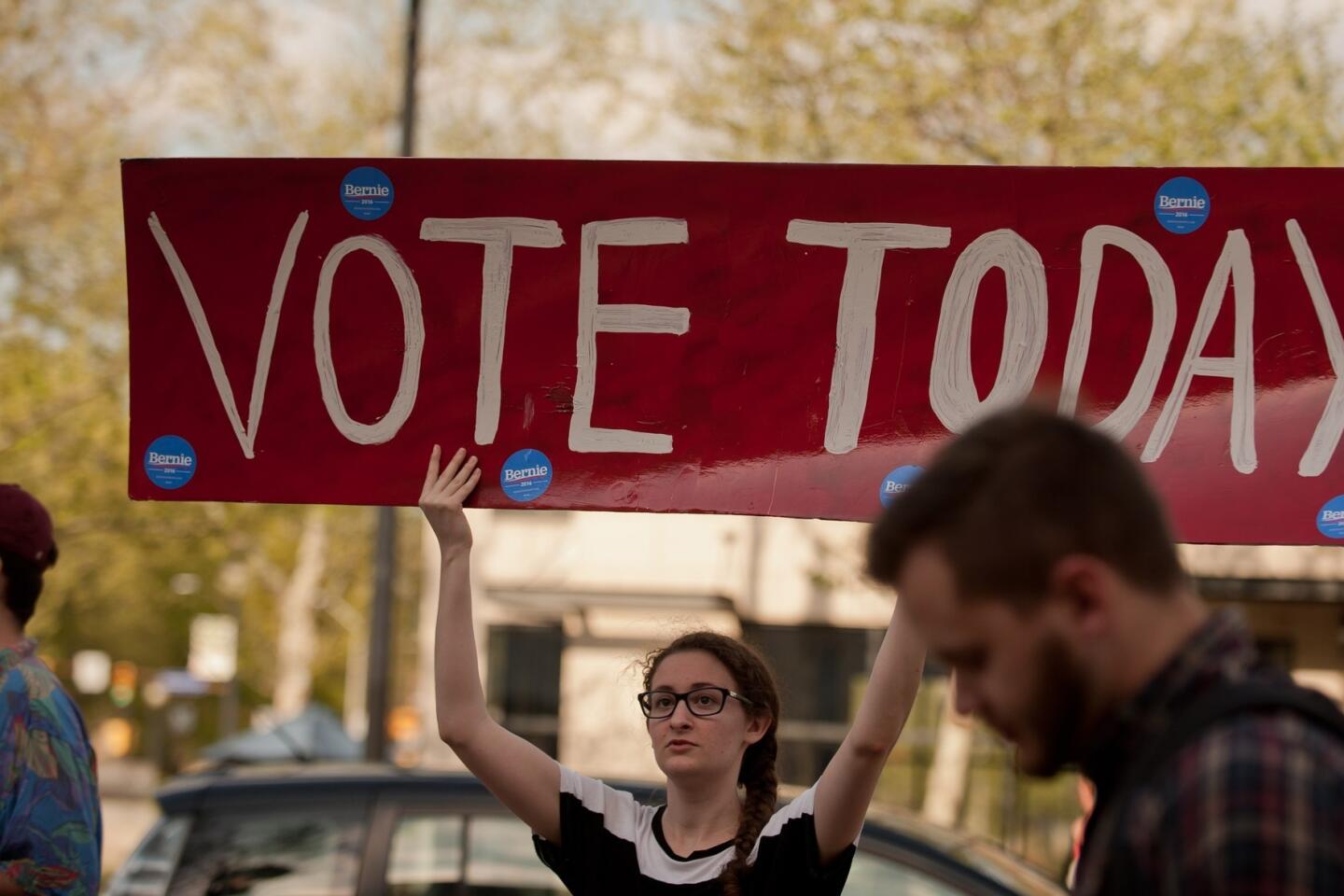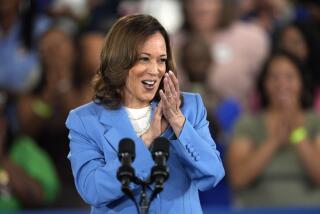Clinton wins 4 pivotal Eastern primaries to Sanders’ 1 -- but he’s not calling it quits

Hillary Clinton celebrates with supporters in Philadelphia.
- Share via
Reporting from Philadelphia — Hillary Clinton built an all but insurmountable delegate lead over Bernie Sanders on Tuesday night with victories in four out of five Eastern states, leaving the Vermont senator with little choice but to focus on influencing the Democratic Party’s agenda rather than winning its presidential nomination.
The results marked a pivot point in the bitterly fought Democratic contest. After showing remarkable resilience, Sanders signaled that he no longer sees his fight for the nomination as winnable.
Clinton, the former secretary of State, handily won the Democratic primaries in Pennsylvania, Connecticut, Maryland and Delaware. Sanders won Rhode Island.
Clinton’s sizable delegate haul made it almost impossible for Sanders to catch up, even with voting on June 7 in the biggest prize, California. Polls show he faces an uphill race there as well.
In her victory speech here, Clinton called on Sanders’ ardent supporters to help her in what is expected to be a ferocious fall campaign against a Republican ticket.
She ticked off some of the populist issues that have driven his insurgent campaign.
“We will unify our party to win this election and build an America where we can all rise together,” she said. “I applaud Sen. Sanders and his millions of supporters for challenging us to get unaccountable money out of our politics and giving greater emphasis to closing the gap of inequality. And I know together we will get that done.”
She added: “Whether you support Sen. Sanders or support me, there is much more that unites us than divides us.”
Her convincing wins Tuesday, and her advantage among superdelegates, give Clinton about 90% of the 2,383 delegates needed to clinch the Democratic nomination, according to the Associated Press. Clinton has 2,141 while Sanders has 1,321, according to AP.
In a statement, Sanders did not withdraw his candidacy but appeared ready to stop the aggressive attacks that have defined the race over the last several weeks.
He said he would continue accumulating delegates in the 14 remaining contests in an effort to make the party platform more liberal at the Democratic convention in July.
“The people in every state in this country should have the right to determine who they want as president and what the agenda of the Democratic Party should be,” he said. “That’s why we are in this race until the last vote is cast. That is why this campaign is going to the Democratic National Convention in Philadelphia with as many delegates as possible to fight for a progressive party platform.”
In the key battleground state of Pennsylvania, Clinton won the large urban and suburban areas, according to exit polls conducted for AP and major television networks. Sanders won a majority only among the state’s rural voters, who made up just a fifth of its Democratic electorate.
Clinton also won among Pennsylvania voters who listed the economy, healthcare and terrorism as their top concerns. Only those voters who listed income inequality as their top issue chose Sanders.
A majority of voters also said Clinton would be better at handling gun policy, a major flashpoint on the Democratic side, and one of the few issues on which Clinton has attacked Sanders from the left.
Sanders continued to show strength with young voters, winning more than 8 in 10 of those under the age of 29.
Sanders has won caucuses or primaries in 17 states, an impressive performance by a democratic socialist who began far down in the polls. But he has struggled in more densely populated, diverse parts of the country that are crucial to winning the Democratic nomination.
His winning streak came to an end in delegate-rich New York last week, when his weak performance among minorities and women resulted a rout by Clinton that helped boost her delegate lead.
The same demographics that tripped up Sanders in New York were at play in Pennsylvania and Maryland.
In a predominantly black neighborhood in West Philadelphia on Tuesday, Clinton’s decades-long ties to the black community were evident in interviews with voters streaming into a polling station.
“This is a loyalty thing,” said Rob Troy, 69, a lifelong Democrat who worked for 25 years removing asbestos from the city’s aging row houses. “The Clintons have been loyal to Democrats, to the black community. They’ve been with us.”
Jamil Glover, a 28-year-old school counselor, was also swayed by Clinton’s long history with black voters. Sanders remains a relative unknown to him.
“I know that with Hillary comes Bill, and we’re good,” Glover said.
The senator from Vermont arguably had some home-court advantage in Connecticut. But he was battered for his more centrist position on gun control.
The state is still struggling to heal from the mass shooting of 26 children and staff members at Sandy Hook Elementary School in Newtown in December 2012, and Sanders drew ire from local leaders when he questioned the right of families of victims to sue the manufacturer of the rifle used in the massacre.
Sanders has been under pressure all week to refocus his energy to help unite the party. Party leaders caution that attacks on Clinton serve little purpose now other than to weaken her for the fall.
Clinton regularly reminds voters that her 2.7-million-vote lead over Sanders far exceeds the biggest lead Barack Obama had over her when the two competed in the 2008 primary.
Sanders told CNN on Tuesday that he would not hesitate to push an agenda on the convention floor that Democrats already have seemingly rejected in the primaries.
They include his call for a European-style government-run healthcare system and free tuition at public universities. Clinton has rejected both as unfeasible.
“You don’t know what the delegates there will do,” he said to the network’s Chris Cuomo. “If you do, please tell me, but you don’t. So we are going to go to the American people and say this is the agenda for the working people.... I think that we can win some of these platform fights.”
Sanders’ strategy could backfire. If his effort falls short in Philadelphia — or if it goes too far — Sanders could lose leverage with Clinton if she wins the White House in the fall.
On Monday, Clinton expressed irritation with Sanders’ warnings that she needs to embrace more of his agenda if she wins the nomination and hopes to draw his voters to her side in November.
Clinton said she set no such conditions when she endorsed Obama in 2008 and campaigned for him.
“We got to the end in June and I did not put down conditions,” Clinton said at an MSNBC town hall Monday night. “I didn’t say, ‘You know what, if Sen. Obama does x, y and z, maybe I’ll support him. I said, ‘I am supporting Sen. Obama, because no matter what our differences might be, they pale in comparison to the differences between us and the Republicans.’ That’s what I did.”
But Clinton is also treading cautiously. While polls consistently show Democratic voters are far more willing to unite behind their eventual nominee than they were at this stage of the bitter 2008 contest, the voters turning out for Sanders are a unique bunch.
Many are involved in politics for the first time. They skew young, and they express frustration with a nominating process that the Sanders campaign has argued is rigged for establishment favorites like Clinton. She is trying hard not to alienate them.
That is no easy task. Many of those voters have no plans to give up on the Sanders agenda anytime soon.
“I want to plant my flag over there to keep the Democratic Party leaning left,” said Adam Woolley, a 31-year-old acrobatics coach, who voted in downtown Philadelphia with his husband, Jefferson Grubbs, a 27-year-old writer. “It’s been a long time since I’ve voted or wanted to vote in a Democratic primary.”
Both men cast ballots for Sanders, but are well aware of the long odds he faces.
“I just feel like I can’t not support him,” Grubbs said. “I can’t vote for the status quo any more.”
Halper reported from Washington and Lee from Philadelphia.
Times staff writers Kate Linthicum contributed to this report from Philadelphia, Noah Bierman from Washington and Seema Mehta from Huntington, W.Va.
MORE FROM POLITICS
Will Trump Democrats play a role in the 2016 presidential race?
The Cruz-Kasich merger and four other things to watch in Tuesday’s primaries
Voters’ ‘Bernie or Bust’ efforts persist despite Sanders’ vow not to be another Ralph Nader
More to Read
Get the L.A. Times Politics newsletter
Deeply reported insights into legislation, politics and policy from Sacramento, Washington and beyond. In your inbox three times per week.
You may occasionally receive promotional content from the Los Angeles Times.

